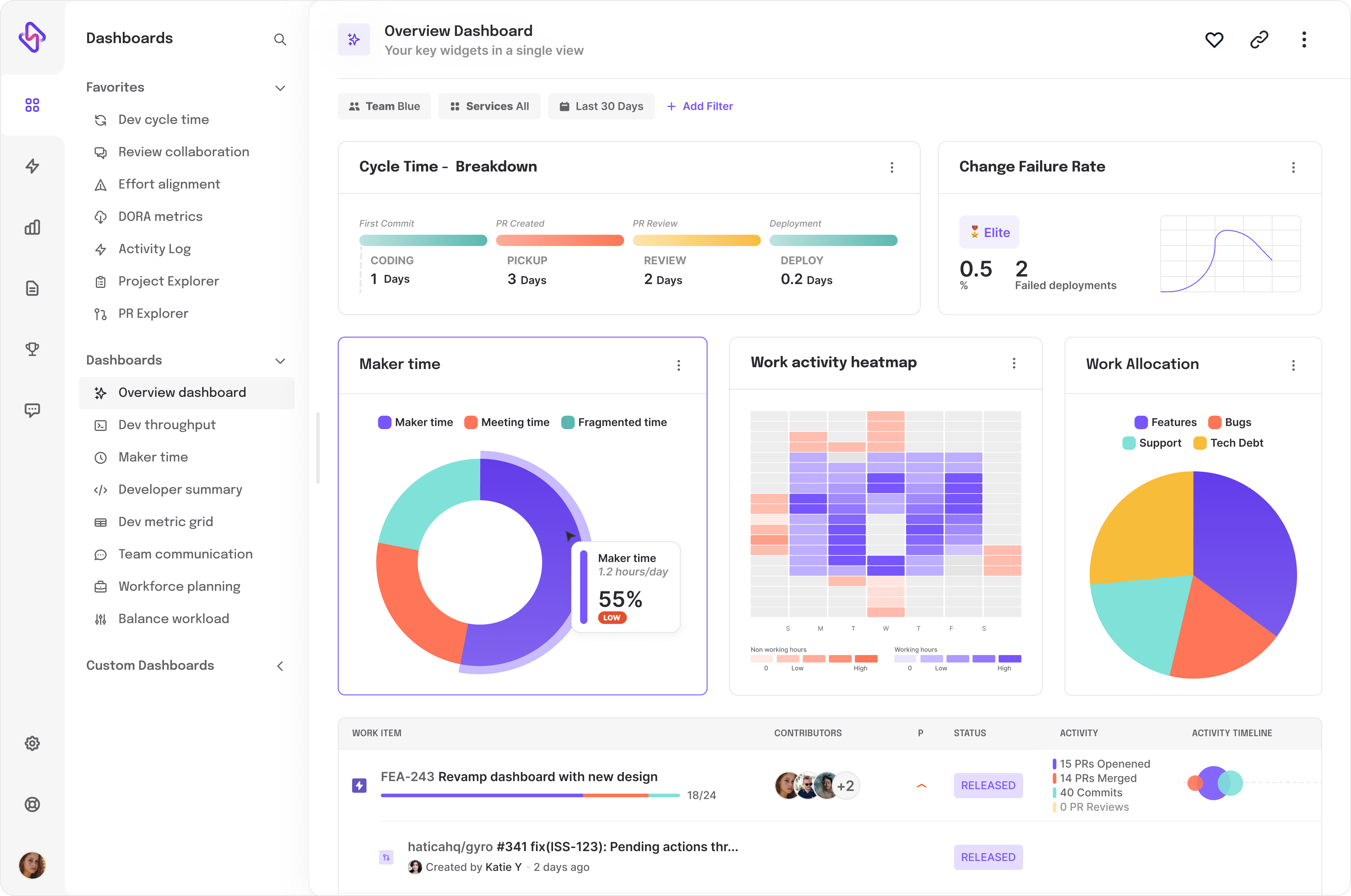Managers often report feeling more productive than the engineers they lead, and this productivity perception gap widens as individuals rise through the ranks. While managers and senior engineers (Staff+ ICs) generally feel confident about their contributions, their teams may struggle with feelings of underperformance or even impostor syndrome.
This disconnect can be problematic for both morale and productivity. When individual contributors feel less productive or undervalued, it impacts not only their self-esteem but also their overall output. Meanwhile, leaders who believe they are more productive might unintentionally overlook their engineering team's challenges, missing opportunities to provide support, mentorship, or adjustments in workload.
For engineering managers, it’s crucial to bridge this perception gap by actively seeking feedback, understanding individual productivity blockers, and fostering open communication channels.
So, how can you close this gap? We'll cover this in detail in the next section.
Key Leadership Skills Every Engineering Manager Needs for Organizational Impact
Balancing Quick Wins with Long-Term Growth
One of the most crucial leadership skills for engineering managers is the ability to make sound, timely decisions, especially in fast-paced and high-pressure environments. You as an engineering manager, are often faced with decisions that have lasting consequences—not just for the current project but for the engineering team’s future capacity and agility.
While the temptation might be to base decisions on immediate technical needs, successful engineering managers take a holistic view, carefully balancing short-term demands with long-term sustainability.
Rather than framing decisions around choosing a technology stack or fixing bugs, consider the broader impact of those choices on the overall code base and across projects. For example, should you push for immediate delivery of a feature at the cost of accruing technical debt? How will this decision affect your team's ability to innovate in the next quarter? The ability to zoom out and assess how today's decisions impact tomorrow’s roadmap is what separates competent managers from great leaders.
Additionally, great engineering managers foster a culture where decisions aren’t simply handed down from the top. They create systems where engineering team members contribute to decision-making in meaningful ways, leading to greater buy-in and, often, more innovative solutions. Encouraging engineers to assess potential risks and rewards critically prepares them for future leadership roles, while also ensuring that decisions are made with the most diverse set of insights.
The most successful EMs create an environment where every team member feels comfortable voicing concerns without fear of judgment. This helps ensure that managers have a clear understanding of what’s impacting their team's productivity and can make informed decisions to address those challenges.
Furthermore, aligning team goals with business objectives in a way that resonates with each engineer's personal motivations can help reduce this disconnect. When engineers understand how their work contributes to the broader company mission—and feel supported in their professional growth—they are more likely to feel productive and engaged.
Ultimately, the goal is to create a unified sense of productivity across all levels, where both managers and engineers feel aligned in their efforts and achievements.
Leveraging Data to Navigate Tough Calls and Drive Success
In our blog on the four pillars of engineering productivity, we highlighted an important truth:
"What cannot be measured cannot be improved. Setting up your engineering team for success is tricky because neither productivity can be measured directly, nor are the ways to monitor and improve it foolproof!"
This leads to a key question for engineering leaders: “What should we measure?” Simply avoiding measurement isn't an option, but measuring everything can also lead to confusion.
Every engineering team is different, so the way you measure productivity has to fit your team's setup, structure, and business needs. The data points that matter to a small, fast-moving team might not work for a large, established one. The challenge isn’t just collecting data but ensuring that what you're tracking really reflects your team’s performance.
For example, while metrics like Cycle Timeor Mean Time to Recovery (MTTR) can show how quickly your team moves or how fast systems recover, they might not tell you everything. Should you also be looking at things like Code Review Time to understand how well your engineering team collaborates?
But it’s not just about collecting the right data. You need to understand what the data is telling you in context. Improving a metric like cycle time by 10% might seem like a win, but if it’s hurting team morale or leading to poor-quality code, then it's not really a success.
The key is to balance numbers with the human side of things. Metrics help you see trends, but you also need to consider factors like team happiness, communication, and individual growth. Engineering leaders who can blend both data and insights gathered from on-ground developer sentiment are the ones who truly boost productivity and create a successful working environment.
Leading Through Change with Flexibility
While data-driven decisions are important, being adaptable is just as crucial for engineering managers. Even the best-laid plans can change, whether it's due to shifting business goals or unexpected technical debt. Leaders who can adjust quickly without losing sight of the bigger picture are the ones who keep projects on track.
For instance, imagine you’re tracking Deployment Frequency and notice a dip due to an increase in system bugs. Instead of pushing your team to move faster, an adaptable leader would take a step back, figure out the root cause, and maybe shift focus to fixing those bugs or improving testing. This flexibility helps maintain productivity while ensuring quality and team morale aren’t compromised.
But adaptability isn’t just about handling technical challenges. It’s also about being in tune with your team. Every engineer works differently, and as teams evolve, so do their needs. A good leader knows when to give more guidance or when to step back and let the team take the lead. Being flexible with your management style shows that you're focused on what’s best for the team in any given situation.
Building Stronger Leadership Game
Software engineering presents unique challenges at every stage, and the complexities are always evolving. Leadership in this space is less about finding one-size-fits-all solutions and more about maintaining a mindset of continuous improvement, strategic thinking, and empathy for the diverse needs of your team.
The leadership skills we’ve discussed—sound decision-making, data-driven strategies, and adaptability—aren’t boxes to check off but practices to refine over time. They need to be inculcated and practiced to form a part of a thriving engineering culture. Sometimes, good decision-making means taking a step back to gather more information. Data may occasionally lead to unexpected insights, and responding to those insights requires both flexibility and courage. Adaptability, in particular, isn’t just about reacting to external changes but continuously adjusting how you support and guide your team as they grow.
It’s easy to focus solely on results, but as engineering managers, our real goal is to curate a space where innovation, collaboration, and personal growth thrive. This is what sets engineering teams up for long-term success and keeps the organization moving forward.
As you reflect on your current role, consider where these leadership skills could make the most impact. What adjustments can you make to enhance your engineering team’s performance or better align with the evolving needs of the business? Small, thoughtful changes today can lead to big results down the road, shaping both your engineering team’s future and your own path as a leader.




